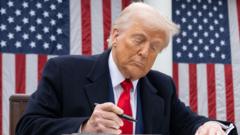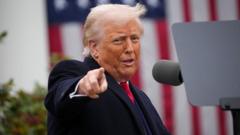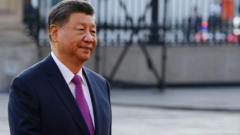Recent hacks attributed to Chinese state-sponsored groups have raised significant concerns among U.S. officials, with implications affecting national security and personal data of millions of Americans being exploited.
Rising Concerns Over Chinese Cyber-Attacks Targeting the U.S.

Rising Concerns Over Chinese Cyber-Attacks Targeting the U.S.
U.S. officials express alarm as a series of cyber-attacks linked to Chinese hackers breaches sensitive information across various government and telecommunications entities.
In recent months, a worrying pattern of cyber-attacks attributed to Chinese hackers has emerged, raising alarms across the United States. U.S. officials have indicated that these breaches involve major telecommunications firms and agencies, including a recent incursion into the U.S. Department of the Treasury, which officials have deemed a "major incident." Hackers reportedly accessed employee workstations and unclassified documents, while China has denied any involvement.
The timeline of these attacks includes targeting major U.S. presidential campaigns by actors connected to the Chinese government, as noted by the FBI and the Cybersecurity and Infrastructure Security Agency (CISA). Moreover, earlier reports indicated breaches at key telecommunications companies such as AT&T and Verizon, culminating in at least nine companies being identified as affected. This follows the March indictment of seven Chinese nationals accused of orchestrating hacking operations for over a decade, focusing on foreign critics of the Chinese regime, as well as businesses and political figures.
Experts highlight that the recent hacks demonstrate a concerted effort to gather sensitive data, particularly targeting prominent Democrats, including the President-elect and Vice-President-elect, as well as their associates. Hackers even accessed a database linked to law enforcement wiretaps, potentially compromising investigations into foreign spies. Richard Forno, assistant director at the University of Maryland's Cybersecurity Institute, suggested the attacks aim to obtain general intelligence on various targets.
U.S. lawmakers are voicing serious apprehensions regarding these hacks, labeling them one of the most significant cyber-espionage events in history. Senator Mark Warner referred to the telecoms breach as “the worst telecom hack in our nation’s history.” Similarly, FBI Director Christopher Wray described China's hacking initiatives as unparalleled compared to other nations.
Responses from Western allies have included legal actions against Chinese nationals, with the U.S. recently issuing a warning to China Telecom Americas over potential national security threats. The UK has also imposed sanctions against individuals and companies connected to these hacking activities.
In counter-assertions, China’s government has dismissed these allegations as baseless, characterizing them as attempts by the U.S. to deflect from its own cybersecurity issues. China's Foreign Ministry has consistently rejected accusations of state-sponsored hacking, urging a halt to what it calls misinformation campaigns from U.S. officials.
As the cyber landscape grows increasingly hostile, experts suggest the U.S. must adopt a more proactive approach to counter espionage efforts traditionally characterized by long-term strategic planning by Chinese cyber units.






















